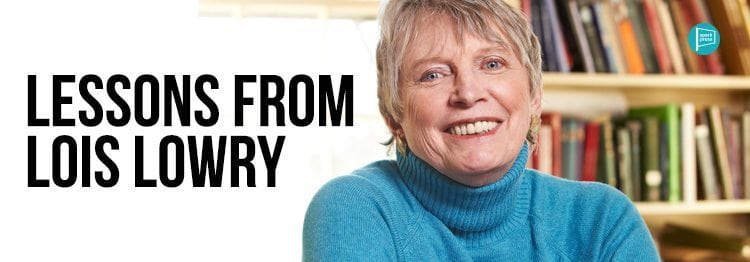 Happy birthday, Lois Lowry! As one of the most well-known award-winning children’s authors of the last few decades, she has taught us a lot over the years.
Happy birthday, Lois Lowry! As one of the most well-known award-winning children’s authors of the last few decades, she has taught us a lot over the years.
On inspiration:
Lowry was a military brat, and travelled around the world with her family. She learned observational skills—essential for a writer—from constantly changing schools. From life on a military base, she had a deep understanding of order and sameness, which she was able to push to an extreme, becoming the world in which became that of The Giver.
“Oddly, the military world is one of great sameness. There is an orderly quality to life on an army base, and even the children of the military are brought up with that sense of order and sameness.”
—Lois Lowry
You can’t just use your memories as inspiration—unless, of course, you’re writing a memoir. For fiction, you have to expand upon it, take the ideas from it. Look at the day through the eyes of someone else, or yourself at a different age.
“Most people remember being 4 objectively, as if they’re seeing a movie of a 4-year-old. But me, if you ask me to think about when I’m 4, I can feel myself being 4, and I am there, looking out through my 4-year-old eyes.”
—Lois Lowry
On the intelligence and curiosity of children:
Lowry has raised four children, and now even her grandchildren are grown. As a children’s author, she hears from kids all the time, brimming with curiosity.
“Kids have no sense of appropriateness. They can ask me whatever they want. You do develop a sense of intimacy with readers, and they tell you things about themselves. During a school year, I’ll get e-mails asking about the books. I’ll give them information, but I won’t do their homework for them.”
—Lois Lowry
She believes in the encouragement of their curiosity and letting them make choices and mistakes.
“I believe without a single shadow of a doubt that it is necessary for young people to learn to make choices. Learning to make right choices is the only way they will survive in an increasingly frightening world.”
—Lois Lowry
One day these children are going to inherit the world, and without the decision-making skills, they’ll never be able to reach their own dreams or help others. They can do so much, but not if they don’t learn to believe in themselves.
“Kids deserve the right to think that they can change the world.”
—Lois Lowry
On writing:
There are two types of writers; those who meticulously plan their stories ahead of time, and those who prefer to fly by the seat of their pants, letting the story unfold as they write it. Lowry is definitely in the latter group.
“I prefer to surprise myself as I’m writing. I’m not interested in it if I already know where it’s going. So I have only the most general sense of what I’m doing when I start a story. I sometimes have a destination in mind, but how the story is going to go from Point A to Point Z is something I make up as I go along.”
—Lois Lowry
One way to do this is to create characters that are so real, they develop minds of their own. They start doing things you never expected, because it’s true to who they’ve become.
“When I create characters, I create a world to inhabit and they begin to feel very real for me. I don’t belong in a psych ward, I don’t think, but they become very real, like my own family, and then I have to say goodbye, close the door, and work on other things.”
—Lois Lowry
This level of closeness with your characters, while sometimes emotionally straining, can be felt by your readers. It’s one of the most important elements in crafting a work that will resonate with your audience. You don’t need to set out to write something Important-with-a-capital-I. Themes will emerge as you write. Just focus on character, setting, and plot. The rest will follow.
“I always set out to tell a good story, to create a character that young people can relate to, place them in a situation that will be interesting, intriguing, eventually suspenseful. But what I find is that after I do that, then there are themes that emerge, which teachers can then use to provoke discussion and debate.”
—Lois Lowry
What is your favorite Lois Lowry novel?

Leave A Comment